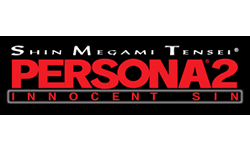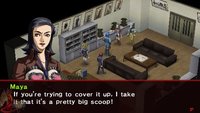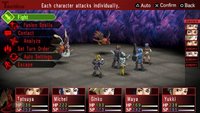|
|

|
PLATFORM
|
PSP
|
BATTLE SYSTEM
|

|
INTERACTION
|

|
ORIGINALITY
|

|
STORY
|

|
MUSIC & SOUND
|

|
VISUALS
|

|
CHALLENGE
|
Adjustable
|
COMPLETION TIME
|
20-40 Hours
|
|
OVERALL

|
+ Engaging, thoughtful characters
+ Gonzo plot twists galore
+ Plenty of optional content
+ Auto-battle and skippable attack animations
- Long, slow battles
- Boring dungeons
|
Click here for scoring definitions
|
|
|
Shin Megami Tensei: Persona 2: Innocent Sin is fun, but aggravating. Its story runs the gamut from deeply personal to over-the-top nutty, stopping in between for commentary on the modern world and the nature of dreams. Had the original PlayStation version been released in America in a timely manner, it would have made a huge splash -- and not just because of the material that's been slightly censored for all editions of the PSP release. However, even with its upgraded interface, Persona 2 feels like a relic of an earlier age. The dungeons are long, visually unappealing, and run up the game timer without ever crossing into hardcore challenge territory. The battle system showcases plenty of bells and whistles, but the high encounter rate silences them before the endgame. Praising the excellent auto-battle system feels like a backhanded compliment, but its aid in bypassing fight-combo-heal encounters is difficult to ignore. Despite Persona 2's old-school flaws, not recommending it would be a sin due to its characters and plot.
It all starts with a rumor. Rumors in Sumaru City have started to come true, leading to a plague of ugliness at the aloof protagonist's high school. Who could be behind those rumors, but the bad boys at the rival high school? The stakes expand quickly from interschool shenanigans to wild Fortean adventures spiked with dreamlike psychodrama. Persona 2 uses its grand, cosmic backdrop to magnify the adolescent concerns of its protagonists until they pop with energy. Individual scenes can be hammy and melodramatic, but the contemporary setting dulls the sting. After all, to a wannabe rock star like Eikichi, there isn't much of a line between his mundane problems and the strange events throughout city. Both are world-shaking events that throb with fragile emotions.
Most of the protagonists aren't sure what to do with their lives when the story begins. They have vague ideas, but ones that have yet to be tested against outside forces. As they beat back demons and unravel the mystery of the rumors, their personal issues bounce engagingly off matters of cosmic importance. Unlike many games, where the player is asked to assume the party works well together, Persona 2 shows the protagonists grow together as a team. In a world where the characters are separated from normal teenagers only by their personas, getting the cute boy to fall for you is an important step in saving the world.
 Maya is as trustworthy as her outfit is improbable.
Maya is as trustworthy as her outfit is improbable.
|
|
Personas are elements of a character's personality, plucked from humanity's collective unconsciousness and stuffed into the form of supernatural creatures. In other words, the characters gain power from exploring their emotions. The wild hodgepodge of persona options are a strong match for the protagonists' feelings. For example, Lisa's loving (bordering on creepy) nature means she's well paired with Lovers-type personas. These guys run the gamut from cute, innocent mascots to mythological lotharios and demonic rock stars. However, her compatibility changes over time. This mechanical representation of the story’s themes of self-exploration goes a long way toward excusing the game's downsides.
Despite the enhanced PSP treatment, the graphics and sound aren't major draws. The remixed audio tracks are serviceable, but unmemorable. The voice acting fares better, but doesn't tread any new ground. The graphics are a larger hurdle. Character sprites are small and smudgy, spell effects are unimpressive, and most dungeons are bland. On a related topic, the dungeon design itself is basic. Several mazes feature annoying gimmicks that are either poorly explained or repetitive padding. Most are warrens of identical chambers and hallways. The onscreen minimap and easily accessible full map stop the dungeons from being truly dreadful. Instead, they're merely boring.
Battles are turn-based affairs bolstered by a handful of fun quirks. The foremost is the curious nature of demons. All non-boss enemies are willing to negotiate with the heroes before turning to fisticuffs and bloodshed. Every hero has four different ways to contact enemies, from the main character's beat boxing to Eikichi's macho posturing. Characters can also team up for group bargaining that's based on their feelings toward each other. Each action makes the enemy happier, angrier, more eager, or scared. Maxing out an enemy's happiness gauge forms a contract with the enemy, leading to bonuses in future battles. Maxing out the eagerness gauge earns a fistful of tarot cards as a token of the monster's appreciation. These cards can be used to summon new, stronger personas. The monsters' reactions go a long way in differentiating the tone of the game from other supernatural monster hunts. These are demons who're scared of their mothers, read magazines filled with pictures of cute boys, and offer their immortal perspective on the problems of youth. They're forces of darkness and chaos, but relatable ones.
Bargaining with gods and monsters occasionally takes on the grinding tenor of Final Fantasy VIII's Draw System. Farming specific cards requires watching the same negotiation skits repeatedly. Fortunately, overloading on tarot cards doesn't ruin the game's challenge. They can't be used to summon new personas until the character is close to the persona's level. Moreover, no persona starts with its full compliment of spells: each one gains experience separately.
 The guitar is the ultimate weapon!
The guitar is the ultimate weapon!
|
|
Personas can be switched throughout combat. Mastering this skill is important, as each persona's strengths and weaknesses impact its host. Fielding several personas who're weak against Light attacks is suicide when up against enemies with instant-kill Light attacks that target the entire party. There's room for lots of micromanaging here, but it's not necessary. Decent, workhorse personas are easy to obtain. The difficulty comes in if you're trying to catch 'em all or unlock all of the combo attacks. Combo attacks are secret combinations of persona spells that require two or more characters. Some combo attacks simply require two common spells. Others require special spells that only one or two persona know how to cast.
The trivial choices most games ask matter here. They lead to new abilities and character relationships. There are very few "But thou must!"-style choices. Several optional quests enhance the artificial freedom. As a result, the world feels like it's influenced by the player's action, despite the inevitable ending. Within the rigid JRPG framework, however, there's wiggle room for playing with the characters and their statistics.
Unlike many of the side paths, which are limited-time events, the Climax Theatre is open for business throughout the entire story. The theatre provides two new, PSP-exclusive quests. It's difficult to turn up one's nose at bonus stories, especially when they expand on the central plot's rocky adolescence. However, their implementation isn't without problems. The central fault is the inability to save during these quests. Even though one of them is divided into two sections, each portion is long enough to become a slog of attrition. Furthermore, dungeon design, never one of Persona 2's strong points, takes a dive. Frequent trapdoors, teleporters, and boring school hallways conspire to make the bonus dungeons into locations to endure rather than relish. Still, anyone who wants to see a new batch of Sumaru City's citizens respond to the darkness are encouraged to check out the theatre.
Shin Megami Tensei: Persona 2: Innocent Sin doesn't bring any mechanical wonders to the table, but uses what tricks it has to keep the excellent story rolling along. Although the game can be completed in less than 40 hours, rushing through all the optional content would be a shame. The top-notch localization reveals a captivating, imaginative world that's worth a little agitation. Like high school and battling demons, Persona 2 is rough around the edges, but ignoring the opportunity is even worse.
Review Archives
|









